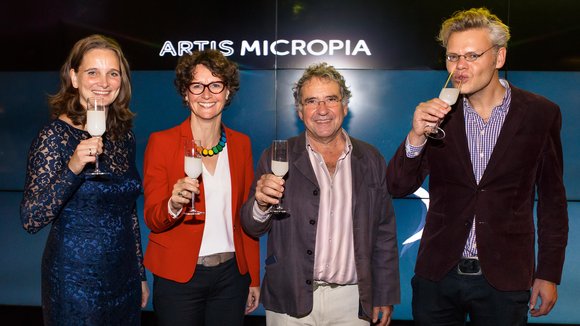
From left to right: Eveline Hensel (Micropia director), Cyrille Krul (TNO), Haig Balian (ARTIS director) and Remco Kort (Micropia-professor VU University) toast with a probiotic drink to the start of the National Guide.
Positive impact on health
Probiotics are microbes that, if administered in sufficient quantity, have a positive impact on health. Microbes are organisms that are too small to be seen with the naked eye, such as bacteria and fungi. Every human being has some hundred thousand billion microbes in their body. Microbes are essential to our health. They train your immune system and fight pathogens in your intestines. The consumption of probiotics when taking antibiotics has been proven to reduce the duration and intensity of diarrhoea and, in many cases, it even has a preventive effect.
Fear of the unknown
We know that the use of probiotics is important for the prevention and treatment of diseases. For example, probiotics are given to babies that are born prematurely to prevent NEC, life-threatening damage to the intestine that mainly occurs in premature babies. And this is just one of many examples.
However, there is a great deal of controversy around probiotics. So far, the Netherlands Food and Consumer Product Safety Authority (NVWA) has rejected almost all the health claims around probiotics at European level. All manner of studies, results and products are available, but there is a great deal of confusion over which microorganisms can be used when. Moreover, experts do not always agree on when a positive effect has been clinically proven. The uncertainty over what can and cannot be done and what has and has not been proven makes healthcare providers reluctant to use probiotics and keeps consumers in the dark and scared to use them.
National Guide
TNO and Micropia have today given the go-ahead for the development of a National Guide. The guide will contain an overview of clinically proven probiotics for use when taking antibiotics. The guide will serve as a tool for patients, consumers and professionals such as GPs, dentists and pharmacists. Efforts will therefore also be made to collaborate with these stakeholders. The initiative aims to prevent symptoms associated with antibiotics and recurring infections. The intestinal flora, or microbes, that allow the intestine to function are crucial to the body’s resistance. Probiotics protect the intestinal flora from the disruptive impact of a course of antibiotics and promote recovery. Because the body’s resistance does not deteriorate as much, the risk of recurring infections is reduced. Fewer infections means fewer courses of antibiotics. Probiotics are therefore a weapon in the crucial fight against the problems of antibiotic resistance . The Netherlands is not the only country that is grappling with issues around the use of probiotics. Questions around the advisability or otherwise of administering probiotics are being asked all over Europe. The plan is to make the guide available to all of Europe. The National Guide will be available at the end of 2017.
